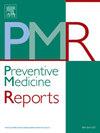Associations of multiple adverse childhood experiences, attachment insecurity and loneliness with physical and mental health difficulties in a representative Slovak sample
IF 2.4
3区 医学
Q2 PUBLIC, ENVIRONMENTAL & OCCUPATIONAL HEALTH
引用次数: 0
Abstract
Objectives
This study aimed to examine the occurrence of adverse childhood experiences (ACE) in the adult Slovak population and to examine the relationships between mental and physical health, ACE, attachment anxiety and avoidance, and loneliness.
Sample and settings
A cross-sectional study with a representative Slovak sample (n = 1018, mean age 46.24 years, 48.7 % men) collected in April 2019 data on ACE (Adverse Childhood Experiences International Questionnaire; ACE-IQ), attachment (Experiences in Close Relationships Revised; ECR-R-14), mental and physical health (SF-8 Health Survey; questions on long-term health difficulties) and loneliness single-item question. Nested linear regression models were employed to analyzed the associations.
Results
Over 75 % of respondents reported at least one ACE, and nearly a third reported four or more. Community violence (43.6 %), violent treating of a household member (38.1 %), emotional abuse (34.4 %) and emotional neglect (30.9 %) were the most common ACE. The average number of ACE was 2.7 (± 2.6). Multiple ACE were associated with attachment insecurity and loneliness. ACE were found to be significantly associated with both physical and mental health. Attachment anxiety and avoidance were linked to mental health, but only attachment anxiety remained significant when loneliness was included. Loneliness was associated with mental and physical health difficulties.
Conclusion
ACE and loneliness are associated with physical health difficulties. ACE, attachment anxiety and loneliness are linked to mental health difficulties. Preventing child maltreatment and addressing loneliness are key to mitigating the long-term health effects of ACE.
求助全文
约1分钟内获得全文
求助全文
来源期刊

Preventive Medicine Reports
Medicine-Public Health, Environmental and Occupational Health
CiteScore
3.90
自引率
0.00%
发文量
353
 求助内容:
求助内容: 应助结果提醒方式:
应助结果提醒方式:


